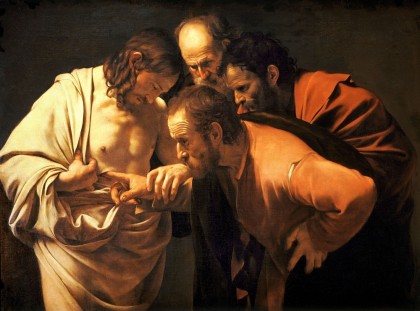Needs become graces; wounds heal
Katie van Schaijik | Apr 13, 2015 | 4 cmts
In remarks before public prayers in St. Peter's Square yesterday, Pope Francis made a point about the Gospel of the day that had struck me too at mass. Always before I had focussed on Thomas' fault, his unbelief. "Blessed are they who have not seen and yet believe." This time I noticed the remarkable tenderness and condescension of the Lord in accommodating Thomas' personal need. Here is the Pope [my emphasis]:
“Thomas is a person who is not easily satisfied, a seeker who wishes to check in person, to attain his own personal experience. After his initial resistance and uneasiness, he too finally reaches the point of believing. ... Jesus awaits him patiently and is attentive to the difficulties and insecurities of the last man to arrive. … [Thomas] was able to 'touch' the paschal Mystery that fully demonstrates God's salvific love, rich in mercy. And like Thomas, we too, on this second Sunday of Easter, are invited to contemplate, in the wounds of the Risen Christ, the Divine Mercy that overcomes every human limit and shines through the darkness of evil and sin”.

Jesus seems to be much more concerned with answering human needs than he is correcting human faults. And then, when those needs are met, they become a source of particular grace and strength. The other Apostles may have believed more readily in the resurrection. But none of them had proclaimed with such clarity and conviction the truth of Jesus' divinity. "My Lord and my God."
I know I'm not the only one who was raised to despise weakness and need, in others and in myself—to rest my hope on my strengths. Slowly but surely, I'm learning better.
We "make up what is lacking in the cross of Christ"—we help heal and redeem the world—exactly by our wounds.

Comments (4)
John Brooks Randle
Apr 22, 2015 5:12pm
I chose Thomas as part of my Carmelite name John Thomas of the Cross. The Pope's first sentence in the excerpt could apply to me. "Thomas is a person who is not easily satisfied, a seeker who wishes to check in person, to attain his own personal experience." Like Thomas I am also Didymus, a twin (with a twin sister). I also chose John Thomas for my maternal grand father, John Thomas Brooks.
If you read my 2 April 1994 letter from Sheldon Vanauken, you will recall his last paragraph, "When I was received into the Church at the Abbey, received by Julian and confirmed by a Benedictine bishop, there was no mention of a new name—not even thought of. If there had been, I might have chosen "Thomas" for the Apostle who made the greatest confession of the Gospel: "My Lord—and my God."
Five years earlier, Van had published in Lent 1989: {to be continued}
16:58-17:12
John Brooks Randle
Apr 22, 2015 5:15pm
{Continued…}
THOMAS OF THE WAY
To George Sayer
(The name 'Doubting Thomas’ is unfair. The Risen Lord had shown his wounds to the others, who must then have doubted also. Thomas, brave and desolate, loved too dearly to hope on what might be their delusion. But when he himself saw, his whole being came into focus; and with a brilliant clarity unmatched by any other, he grasped the Messianic secret and uttered the most precise and profound confession of all the gospel.)
{To be continued}
17:11-17:14
John Brooks Randle
Apr 22, 2015 5:16pm
[John 11]
"They wait to stone you, tear you limb from limb."
—"Men, I must go," said Jesus, firm and brief.
Then Thomas, valiant liegeman of his chief:
"Let us go too, that we may die with him."
[John 14]
A different journey, past the world's far rim:
He said, "But if you go without us, Lord,
How shall we know the way?" His eyes implored;
But "I'm the Way" he found obscure and grim.
[John 20]
Then darkness. Dead his liege and lost the Way.
He durst not hope, nor trust "He lives!" from folk
Who cried they'd seen. His lord was but a clod.
Then, soul alight, he touched the lively clay —
And knew. So Christ's great theologian spoke:
"My Lord," he said, "and (God! I see!) my God."
--Sheldon Vanauken
--Lent 1989
John Brooks Randle
Apr 22, 2015 5:18pm
Footnotes:
A student of C.S. Lewis at Oxford, George Sayer was later head of the English department of Malvern College and one of the Inklings. He is the author of Jack: C.S. Lewis and His Times. Sayer reviewed Vanauken, Sheldon, Mercies, Collected Poems (Front Royal, Virginia: Christendom College Press, 1988) under the title “A Poet in the Great Tradition” in CRISIS, June 1989.
Sheldon Vanauken “Van” (4 Aug 1914 – 28 Oct 1996, Lynchburg, Virginia). Van is the author of A Severe Mercy (1977), A Severe Mercy, Davy’s Edition (1977, 1980), Gateway to Heaven (1980), Under the Mercy (1985), Mercies, Collected Poems (1989), The Glittering Illusion (1989), and The Little Lost Marion and Other Mercies (1996).